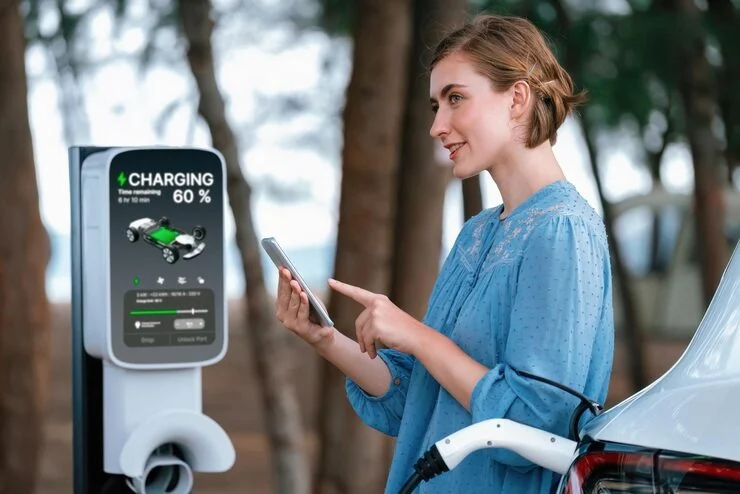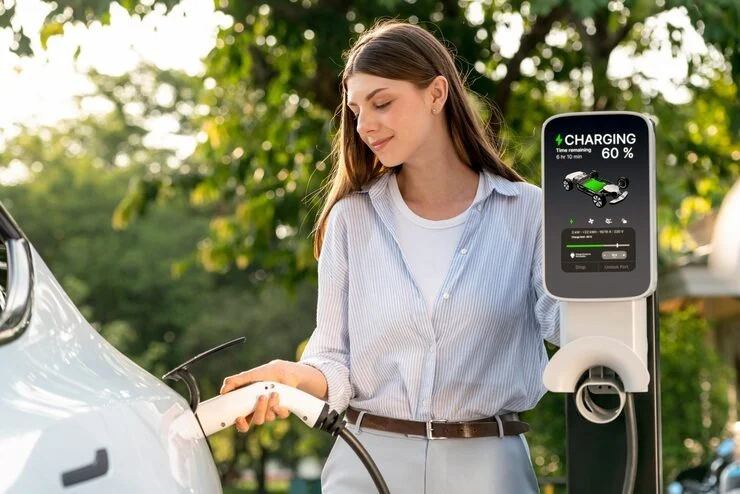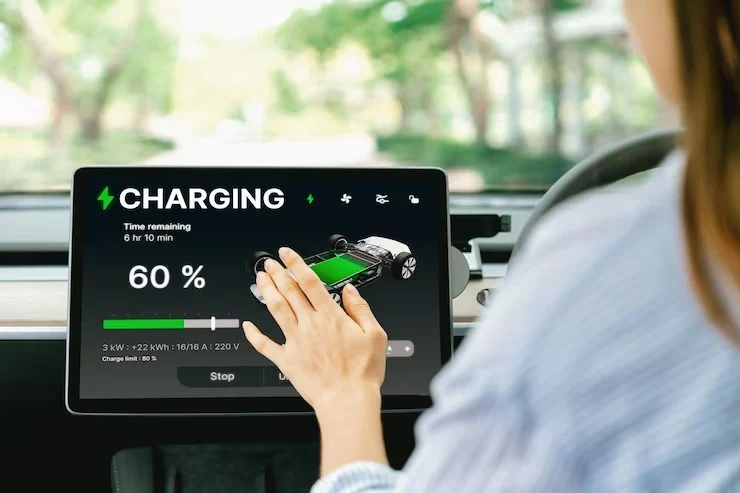Currently, Electric Vehicles, or EVs, are shaping an entirely new image of transportation. With improvements in battery systems, charging infrastructure, and range capability, EVs have been displaced in accessibility and efficiency. Every single EV owner often says to themselves: Should one charge an EV to 100%?
It seems a good idea to keep one’s EV at full charge all of the time, but a few factors contribute to battery health and performance, and that comes into question regarding how long and how often one should charge his/her EV. This article explores battery health, range tips, and charging practices for electric vehicles.

Understanding EV Batteries: A Quick Overview
Before venturing into the intricacies of charging practices, it is paramount to understand how the batteries are functioning in EVs. The majority of the present-day electric vehicles use lithium-ion batteries. These batteries are made up of several cells that store electric energy to power the vehicle. Lithium-ion batteries have limited life expectancy, which depends on charge cycles, temperature, and charging habits.
Charge cycles imply a full discharge of the battery and its recharge. This means the battery does not need to be drained to 0% prior to recharging; partial cycles (for example, charging the battery from 20% to 80%) also accumulate to a full charge cycle. However, the more charge cycles the battery goes through, the more its capacity diminishes, which, in turn, affects the reachable distance of the EV.
How Often Should I Charge My EV to 100%?
You might have been told there’s not much point in charging your car to 100% unless you must. But then, how often should you charge it to 100%?
Ideal Charging Range of an EV
Most EV specialists recommend charging from 80% to 90% under normal conditions. It is argued that this practice maintains long-term battery health. Charges over 80% could stress the battery, with deterioration occurring over time. This is due to the increased voltage levels lithium-ion batteries experience at full charge, which can wear out the cells faster.
Occasionally charging to 100%, when the extra range is needed for an extended trip, isn’t a big problem. However, if you are charging full capacity daily, you may be shortening the life of your battery, which means the range will gradually become less over time.
Charge and Discharge Cycle
The battery chemistry justifies why it is best not to charge your EV to 100% regularly. These lithium-ion batteries are designed to work best between 20% and 80% of their total capacity. This range keeps the stress on the battery to a minimum while preventing overheating, with overheating being one of the primary causes behind battery degradation.
Charging your EV regularly, right up to 100% subjects it to very intensive charge cycles that cause more battery wear. On the other side of the charge cycle spectrum, draining your battery to 0% can also stress the cells enough to shorten their lifespan.
Should I Charge My EV to 80% or 90%?
Are you wondering about this? Driving style and/or requirements weigh in. Usually, a daily charge of 80% should be sufficient for most users because they don’t use the full range of their EV. Thus, EVs usually come with a buffer to ensure the batteries do not go to zero quickly. So, in actuality, there is usually enough charge by way of buffer for an EV to be used to cover most commuting or short distances.
If you are an extended-distance commuter or a road tripper, then maybe charging to 90% would be advised so that you will have some extra range without too much stress on the battery. It’s a delicate balance: range versus battery health.
Charging to 100%: When Is It Necessary?
There are occasions when charging to 100% may just be necessary. Maybe planning for a long road trip or driving farther than usual for your daily commute, an extra charge will help in avoiding running out of juice in an unfamiliar location.
Charging fully can be handy if there will be a long period of inactivity. For instance, an EV parked for several days full charge will ensure that the battery remains in a safe and stable state during that idle period.

Why is charging to 100% Bad?
Charging your EV at 100% on a very frequent basis is not necessarily bad. However, it rather accelerates the battery wear and decreases its long-term capacity for performance. Here are some reasons why you shouldn’t charge your EV battery to 100%.
1. High Voltage Stress
When an EV is charged fully to 100%, the battery works on a higher voltage. Through the years, this will apply stress on the internal parts of the battery, therefore speeding up the degradation of its cells. While manufacturers created the battery management system to accommodate this stress and shield the battery, having an extended period of repeated high-v in cycles depletes its lifespan.
2. Heat Generation
Charging matters in heat generation. Although the BMS does intervene to assist in temperature control, Hill thermal degradation sets in upon sustained exposure to heat. Heat is considered a major obstructive factor in lithium-ion battery lifespan. Charging to a lesser percentage may rescue the battery temperature from being overly heated (to 80% or 90%).
3. Chemical Breakdown
To store and release energy, lithium-ion batteries work upon a chemical reaction. This reaction is straining itself more and more each time a charge to 100% occurs and, with time, chemically breaks down the permissible constitution of the battery. This gradual breakdown happens at the decrease of battery capacity, thus directly affecting your vehicle’s range.
4. Long-Term Performance Issues
The battery slowly loses the ability to hold a full charge when we charge 100% and repeated over-and-over charging creates that. This decrease in full charge holding ability translates into reduced range; in other words, on a full charge, your EV just can’t go as far as it did before.
What About Charging to 0%?
Just like charging an EV to 100% is not good, leaking the battery down to 0% too often is also harmful. Lithium-ion batteries perform best when they are not fully discharged or overcharged. A general good practice is charging between 20 and 80% for most EVs. Draining the battery to 0% makes it undergo deep discharge, which is very harmful, for it stresses the battery cells and increases their degradation.
Best Charging Practices for EV Battery Health
Adopt these practices to maximize the life span of your EV battery and avoid range issues in the future:
Charge between 80% and 90%: For daily driving, charging between 80% and 90% is enough for most people, and it keeps wear and tear on the battery to a minimum.
Avoid Frequent Full Charges: Full charges should be performed only when it is needed, such as for a really long road trip. Do not make a habit of charging to 100% very frequently; this extra strain will wear the battery down.
Don’t Let Your Battery Drain to 0%: Keep your EV’s battery charge above 20% whenever possible. Regularly letting the battery dip too low can lead to permanent damage over time.

Charge Slowly: High rates of charging cause the battery to heat up and age at a higher rate. Therefore, charging slowly, if possible, or using level 2 would be better.
Use Battery Management Features: Many EVs come with features that assist in battery protection by limiting how far it may be charged (for instance, setting a limit to daily charge at 80% or 90%). Use these to help prolong the life of the battery.
Keep the Battery Cool: Thermal management systems for EVs do exist-comparing a cool environment to a warm one would increase the lifetime of the battery.
Conclusion
So, should you charge your electric vehicle to 100%? The answer varies depending on your driving needs, but for daily use, 80%-90% is recommended. Charging to 100% is not necessarily bad, but if you do so regularly, your battery might degrade faster. This would impact range and battery health. So, if you are wondering, “How often should one charge an EV to 100?” the answer is: rarely, if ever.
In general, following the best charging practices like charging up to 80%-90% and never allowing the battery to reach 0% discharge will prolong your EV battery life, thereby facilitating years of reliable performance by your electric vehicle.


